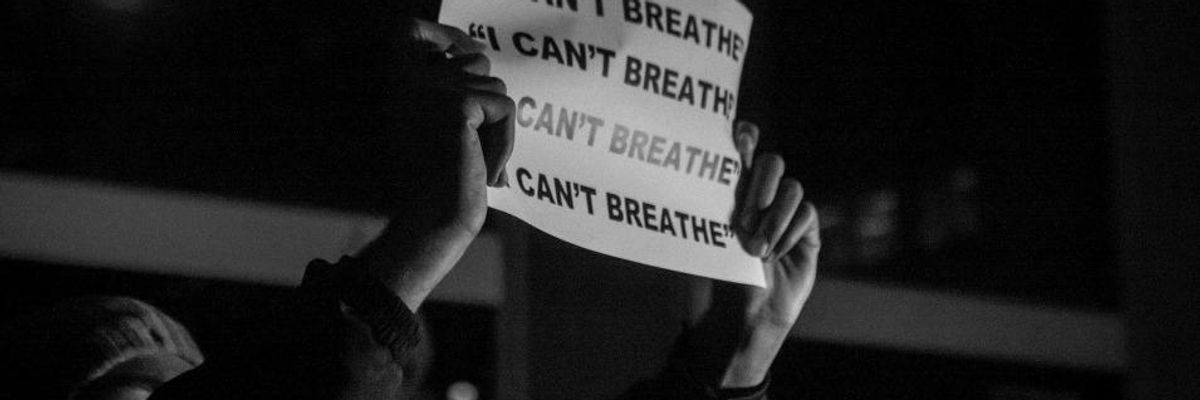As I write, New York City is witnessing its fifth day of demonstrations after a Staten Island grand jury's decision not to indict a police officer in the Eric Garner killing. Those demonstrations followed on the protests across the country over the police shootings of Akai Gurley, a 28-year-old father of two who was slain while walking with his girlfriend in Brooklyn, Tamir Rice, a 12-year-old boy shot by a rookie Cleveland police officer while playing with a toy gun, and, most famously, the Ferguson, Mo., police killing of Michael Brown. Conservatives joined liberals in denouncing the grand jury's outrageous decision in the Garner case. Demonstrations have spread across the country as people of all races have taken up Garner's plea: "I can't breathe."
President Obama met with some of the demonstrators in the White House, where 20-year-old Rasheen Aldridge Jr., director of Young Activists United St Louis, said they made it clear "that we are in crisis." He added, "It is a crisis when a black American can get locked up for traffic fines, but police officers are rarely prosecuted for killing unarmed children." The president, as another attendee later reported, "cautioned us against demanding too big and stressed gradualism. He counseled us that the wheels of progress turn sluggishly." The Justice Department has launched special investigations into the killings of Brown and Garner. The president has announced that he will push for putting cameras on police and has convened a Task Force on 21st Century Policing with instructions to report back in 90 days.
The deaths of Garner, Brown and others at the hands of police are not the only cause sparking mass protests. The day after the Garner demonstrations started, low-wage workers walked off their jobs in more than 190 cities, demanding a living wage and the right to organize. They, too, chanted, "I can't breathe." Workers from fast food-restaurants such as McDonald's were joined by those from low-wage retail and convenience stores and airline service jobs. In Washington, federal contract workers joined the march, calling on the president to issue procurement regulations that would reward good employers that pay a living wage with benefits and allow workers to organize and bargain collectively.
"I can't make it on this type of income," Shantel Walker, 32, who earns $8.50 an hour working at Papa John's Pizza in Brooklyn, told MSNBC. She struggles to get 30 hours of work per week. Many of these workers juggle two or three part-time jobs but aren't told their schedules with enough notice to be able to plan their child care. Taxpayers end up subsidizing their wages with food stamps and Medicaid, while the chief executives of companies such as McDonald's and Starbucks receive more than $9,200 an hour. No wonder the workers can't breathe.
New York Mayor Bill de Blasio (D) offered an emotional and personal response to the Garner decision, repeating the demonstrators' chant that "black lives matter" and admitting that he fears for his African American son, Dante, when he is out at night. The mayor got it right in his campaign: This is about a tale of two cities. It is about the injustice of our criminal justice system and the injustice of our economic system. It is about police shooting African American boys and men with impunity. But it is also about chief executives pocketing millions in bonuses even when their companies lose money, about bankers walking away with millions even after blowing up the economy while more and more working people are in jobs that don't offer the pay or minimum benefits that would enable them to breathe.
After riots swept the streets in 1967, President Lyndon B. Johnson convened the National Advisory Commission on Civil Disorders (also known as the Kerner Commission) to investigate their causes and propose reforms. The commission found shortcomings in the police but recognized their situation was impossible. The police were viewed as occupiers, guarding the haves from racially segregated, impoverished communities ravaged by unemployment and poverty. The commission warned that "our nation is moving toward two societies, one black, one white -- separate and unequal." In essence, there would not be peace unless there was greater justice. It was, as the Rev. Martin Luther King Jr. said, a "physician's warning of approaching death, with a prescription for life" -- a prescription that was never filled.
These demonstrations -- against both criminal injustice and economic injustice -- are only the beginning. In order to breathe, people have begun to move. Efforts to raise the minimum wage have been successful in both blue and red states. They pose a challenge to political leaders at all levels: Lead, or get out of the way. As demonstrations spread, politicians will have to choose which side they are on. Real leaders will choose to walk the walk, not just talk the talk.
